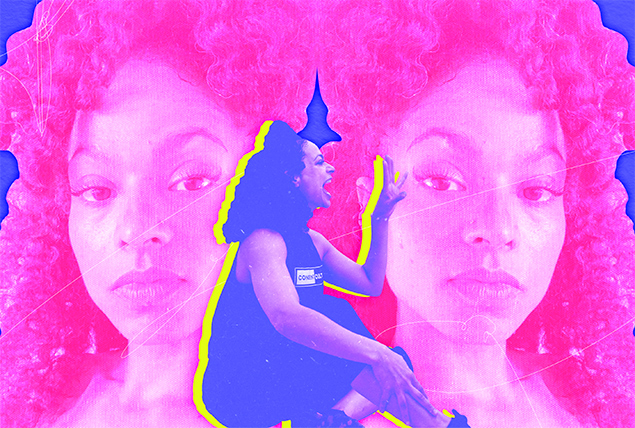Let's Get Intimate: Teniece Divya Johnson Helps Makes On-screen Sex Safer

Name: Teniece Divya Johnson
Current Projects: "Diarra from Detroit" (BET+), "Sharper" (Apple+)
Past credits: "Bros" (Universal Pictures), "West Side Story" (20th Century/Walt Disney), "Modern Love" (Amazon Prime Video), "Succession" (HBO)
You've probably seen the work of Teniece Divya Johnson many times. Since 2014, she has appeared in more than 70 TV shows and movies. Originally trained as a stunt performer and martial artist, Teniece Divya Johnson—who uses the pronouns they/them—always prided themself on being strong.
But during 10 years working in Hollywood as an actor and stunt person—occasionally in roles depicting sex or nudity—Johnson sometimes felt not-so-strong. In fact, they felt powerless.
"The overall feeling was that I didn't have the agency or an opportunity to say no," they explained. "I found myself in situations where the outcome wasn't awesome."
When asked to perform acts or stunts they weren't comfortable with, Johnson would sometimes blame themself for taking the audition or choosing to get involved in a project. Other times, Johnson would try to enforce boundaries, only to find they weren't taken seriously.
"It was like, 'Oh, it's cute when you're angry,'" they recalled.
When Johnson learned about intimacy coordination from Alicia Rodis—the in-house intimacy coordinator for HBO, primarily credited for pioneering the role—they were immediately intrigued.
"I took a lot of hope from the fact that there could be a future where people didn't have the same experience as I had in entertainment," they said.
Johnson began intimacy coordinating on screen and stage in 2017, when the intimacy coordination business was still in its infancy—spawned largely by the #MeToo movement—and hasn't stopped since.
In the years that followed, Johnson would serve as intimacy coordinator on a star-studded lineup of TV shows such as "Modern Love," "Run the World" and "Succession," and movies like Steven Spielberg's "West Side Story" and Nicholas Stoller's "Bros."
Johnson recently founded the Black Intimacy Consent Collective, an organization dedicated to sharing consent education with non-artists.
"We're taking the intimacy coordinator concept from entertainment and trying to get it into other industries—office workers, teachers, tax people, etc.," they explained.
In an interview with Giddy, Johnson talked about the ins and outs of intimacy coordination, their favorite projects and what their job has taught them about sex.
Editor's note: This interview has been edited for clarity and length.
For readers unfamiliar with what an intimacy coordinator does, can you explain the role?
Johnson: I'm a movement storyteller and advocate. I help people have challenging conversations at work so we can create dangerous art and mitigate the risk to human creatives.
You mentioned being an advocate. Could talk a little bit about what that means to you?
For me, advocacy extends to ensuring that specifically Black communities have the opportunity to be centered and talk about consent, boundaries, empathy and saying no in a predominantly white institution.
When I first got introduced to consent, I didn't really think it was something that was applicable to Black people or to Black creativity. So I had to start investigating the ways that consent lived in my world—in my house with my roommates, when I'm on the phone with my friends and when I'm engaging in business relationships, etc.
I could see that if I was more sensitive to my needs and boundaries in these environments, then I could introduce these complicated concepts on set—instead of feeling like I was putting on a "consent cape" just to fix people's problems for the day.
What do you like most about your job?
My favorite thing about my job is having the opportunity to collaborate with artists. In an industry that moves pretty fast-paced, it's challenging for artists because the essential elements to consent—time and space—are not necessarily afforded to them.
I like that I get to meet and talk to performers, and share with them tools to navigate the space based on where they are and what their needs are. And that's challenging too—just because I meet someone and we talk about boundaries or consent five minutes before rehearsal, that doesn't necessarily mean they have the tools that they need to engage in this work. It's not as easy as introducing a tool and saying, "OK, now you have to use it five minutes later."
It's important to meet everybody where they are in their journey and realize everyone has different needs.
What would you say is the most difficult part of your job?
At times, it's really challenging to show up for people in the way they need. Saying, "I hear you. I understand you. If I repeat this back to you, you're asking for this and this"—and then taking that information to other people in the creative team, and working together to make sure these individuals feel seen and heard in their work.
Do you have a favorite project you've worked on?
I'm working on a project right now called "Diarra from Detroit," which will be coming out on BET+ later this year.
I like the different stories of Black intimacy that are being shown on camera. I like having the support of the production team. I like any project where we have the opportunity to tell a new story we haven't seen on camera and get the players excited about the connection that's going to happen on screen.
Has being an intimacy coordinator taught you anything about sex?
It's taught me the possibilities can be endless with consenting adults that know how to lean into challenging and fun conversations. And with that, I learned to be less judgmental when it comes to those forms of expression. I can talk about it without putting my personal experience or filter on it. I'm here to learn and soak it all up.


















